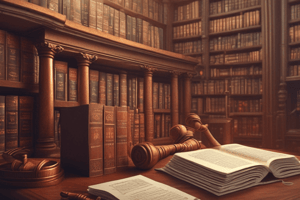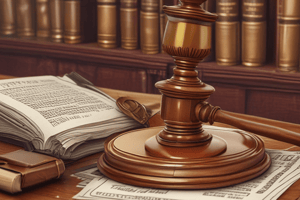Podcast
Questions and Answers
Which of the following best describes the role of a magistrate?
Which of the following best describes the role of a magistrate?
- Reviewing decisions made by lower courts.
- Taking legal action against a person accused of a crime.
- Presiding over cases in courts higher than a magistrates court.
- Hearing cases in the lowest court in the legal system. (correct)
In an adversarial system, the judge or magistrate acts as a representative for one of the opposing sides.
In an adversarial system, the judge or magistrate acts as a representative for one of the opposing sides.
False (B)
What is the term for the division of government into the executive, legislature, and judiciary, aimed at preventing the concentration of power?
What is the term for the division of government into the executive, legislature, and judiciary, aimed at preventing the concentration of power?
Separation of powers
_________ is the act of giving something of value to a recipient with the expectation of influencing their behavior.
_________ is the act of giving something of value to a recipient with the expectation of influencing their behavior.
Match the following legal terms with their correct definition:
Match the following legal terms with their correct definition:
Which term describes the power of a court to hear and decide a case for the first time?
Which term describes the power of a court to hear and decide a case for the first time?
Security of tenure ensures that a judge can be removed from office at any time if the government disagrees with their rulings.
Security of tenure ensures that a judge can be removed from office at any time if the government disagrees with their rulings.
What is the term used to describe the practice of forcing someone to act involuntarily through intimidation, threats, or other forms of pressure?
What is the term used to describe the practice of forcing someone to act involuntarily through intimidation, threats, or other forms of pressure?
Which of the following is the closest meaning to 'discrimination'?
Which of the following is the closest meaning to 'discrimination'?
Creating widespread public opinion regarding a person's guilt or innocence before a trial occurs is known as _________.
Creating widespread public opinion regarding a person's guilt or innocence before a trial occurs is known as _________.
Flashcards
Adversarial System
Adversarial System
A system of trial where two sides argue their case, and a judge or magistrate acts as an independent umpire.
Prosecute
Prosecute
To start legal action against someone accused of a crime.
Defendant
Defendant
A person against whom a legal action has been brought.
Plaintiff
Plaintiff
Signup and view all the flashcards
Separation of Powers
Separation of Powers
Signup and view all the flashcards
Judiciary
Judiciary
Signup and view all the flashcards
Security of Tenure
Security of Tenure
Signup and view all the flashcards
Original Jurisdiction
Original Jurisdiction
Signup and view all the flashcards
Appellate Jurisdiction
Appellate Jurisdiction
Signup and view all the flashcards
Trial by Media
Trial by Media
Signup and view all the flashcards
Study Notes
- Legal terminology is defined
Key Terms
- Adversarial System: A trial system where two sides argue their case, with a judge or magistrate acting as an independent umpire.
- Prosecute: To initiate legal action against someone accused of a crime.
- Defendant: The individual against whom legal action is brought.
- Plaintiff: The person who starts a legal action in a civil case.
- Judge: A court official presiding over cases in courts higher than magistrates or local courts.
- Magistrate: A court official who hears cases in the lowest court in the legal system.
- Discrimination: Unfavorable treatment of an individual based on a protected personal characteristic.
- Separation of Powers: Division of government into executive, legislature (parliament), and judiciary to prevent excessive power concentration.
- Judiciary: The collective body of judges who preside over law courts.
- Security of Tenure: Guarantee that an office holder, like a judge, can't be removed except under exceptional circumstances.
- Appeal: A request to a higher court to review a lower court decision.
- Original Jurisdiction: A court's power to hear and decide a case for the first time.
- Appellate Jurisdiction: A court's power to review a lower court's decision.
- Bribery: Giving money, gifts, or items of value to alter someone's behavior.
- Coercion: Forcing someone to act involuntarily through intimidation, threats, or pressure.
- Trial by Media: Forming widespread opinions of guilt or innocence before a trial or verdict.
- Court Delay: Setbacks in the legal system hindering timely justice.
Studying That Suits You
Use AI to generate personalized quizzes and flashcards to suit your learning preferences.




